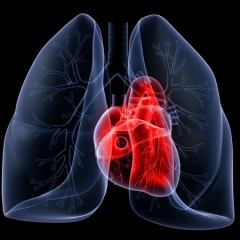
At Weill Cornell Medicine, using a large nationally available database, the Center for Perioperative Outcomes (CPO) of the Department of Anesthesiology and the Department of Cardiothoracic Surgery have teamed up to tackle tough questions related to the care of patients after pulmonary lobectomies. With the expansion of medical technologies and electronic health records, healthcare has had an explosion in the availability of data. This proliferation of data has led researchers to try to understand large-scale retrospective health outcomes. “Healthcare has, and continues to evolve,” stated Dr. Peter M. Fleischut, Founding Director of the CPO and Chief Innovation Officer for NewYork-Presbyterian Hospital. “As healthcare evolves, so must research. The randomized clinical trial remains the gold standard; however, with the greater availability of large electronic data sources for researchers we can utilize these data to drive clinical research initiatives.”
 With the leadership of Dr. Brendon Stiles(Associate Professor of Cardiothoracic Surgery, Weill Cornell Medicine), this team has identified factors associated with postoperative supraventricular tachycardia (POSVT), elements associated with prolonged length of stay, and demographic and clinical associations with hospital readmission, all in patients undergoing pulmonary lobectomy. The studies yielded several important findings. “Our goal was to utilize a large nationally available database to answer three integral questions for this patient population; the impact of POSVT, determinants and causes of readmission, and patient-specific causes associated with prolonged length of stay,” stated Dr. Stiles. “As the medical community increasingly uses metrics like individual complications, length of stay, and readmission rates as surrogates of surgical quality, it is critical for us to understand how patient-based characteristics influence these data points."
With the leadership of Dr. Brendon Stiles(Associate Professor of Cardiothoracic Surgery, Weill Cornell Medicine), this team has identified factors associated with postoperative supraventricular tachycardia (POSVT), elements associated with prolonged length of stay, and demographic and clinical associations with hospital readmission, all in patients undergoing pulmonary lobectomy. The studies yielded several important findings. “Our goal was to utilize a large nationally available database to answer three integral questions for this patient population; the impact of POSVT, determinants and causes of readmission, and patient-specific causes associated with prolonged length of stay,” stated Dr. Stiles. “As the medical community increasingly uses metrics like individual complications, length of stay, and readmission rates as surrogates of surgical quality, it is critical for us to understand how patient-based characteristics influence these data points."
The first study, entitled “Incidence And Implications Of Postoperative Supraventricular Tachycardia After Pulmonary Lobectomy,” published in the Journal of Thoracic and Cardiovascular Surgery, found that POSVT is common in patients undergoing pulmonary lobectomy and is associated with adverse outcomes including increased readmission, length of stay and stroke rate, when compared to patients with an uncomplicated recovery. However POSVT itself was largely associated with specific patient factors that could be identified preoperatively, allowing patients to be selectively given medical prophylaxis.
The team also published two additional works, entitled “Incidence and Factors Associated with Hospital Readmission after Pulmonary Lobectomy,” published in the Annals of Thoracic Surgery, and “Variability In Length Of Stay After Uncomplicated Pulmonary Lobectomy: Is Length Of Stay A Quality Metric Or A Patient Metric?” published in the European Journal of Cardiothoracic Surgery. These articles focused on factors related to readmission after pulmonary lobectomy to identify common causes of readmission and on patient and procedural factors associated with variability in length of stay. Both studies demonstrated that it is patient and demographic factors that drive prolonged length of stay and readmission and raised the question as to whether these endpoints should be taken as surrogates of "surgical quality." Importantly, it appears that predictors of prolonged length of stay and readmission can be identified preoperatively and processes hopefully put in place to identify these patients to efficiently move them through the system.
“Healthcare is changing before our eyes; the measures, the patient population, and the procedural techniques. The research questions presented in these publications are important not only to the individual provider, but for the improvement of the care we provide our patients,” stated Dr. Nasser Altorki, Professor of Cardiothoracic Surgery and the Chief of the Division of Thoracic Surgery at Weill Cornell Medicine. When asked about this successful departmental collaboration, Dr. Hugh C. Hemmings Jr., Joseph F. Artusio, Jr. Professor and Chair of Anesthesiology at Weill Cornell Medicine, responded: “The collaboration between these integral departments at Weill Cornell Medicine continues to push the boundaries of outcomes research and helps us, as clinicians, understand the impact of the care we deliver." This dynamic collaboration seeks to build upon these successes and continue to improve clinical best practices in thoracic surgery.

